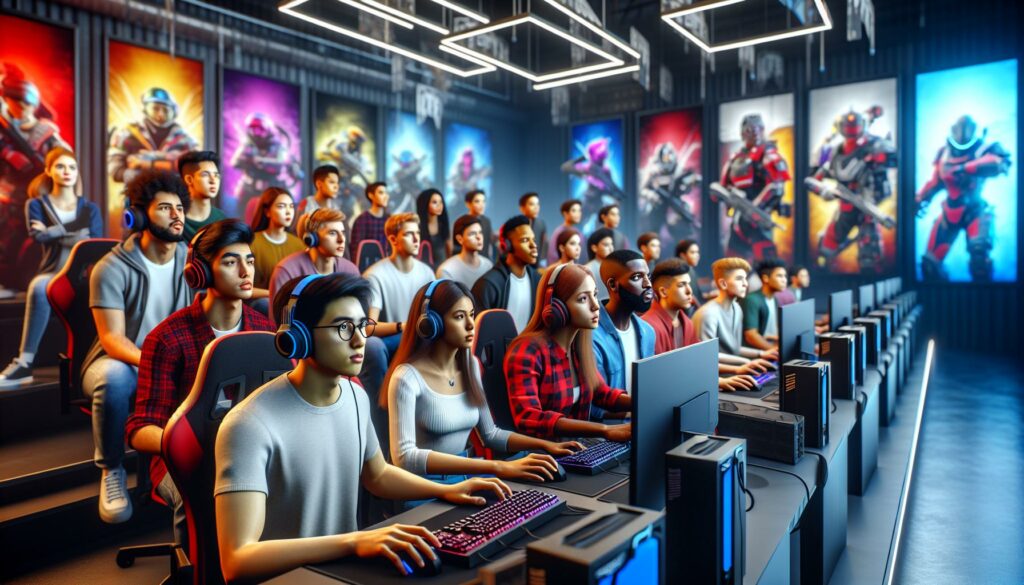As a long-time gaming enthusiast, I’ve watched esports transform from a niche hobby into a billion-dollar industry. It’s fascinating to see how colleges across America are embracing this digital revolution by offering esports programs and scholarships to talented gamers.
I’ve researched dozens of institutions that now feature state-of-the-art gaming facilities varsity esports teams and comprehensive degree programs in gaming management. These colleges aren’t just riding a trend – they’re preparing students for real careers in a booming industry that’s expected to reach $1.87 billion in revenue by 2025. From broadcasting and marketing to team management and game development students can now turn their passion for competitive gaming into a legitimate career path.
- Collegiate esports has grown significantly, with over 175 U.S. colleges now offering varsity programs and dedicated gaming facilities for competitive gaming
- Top esports colleges provide substantial scholarships ranging from $500-$8,000 per semester, including benefits like equipment access, coaching, and travel expenses
- Leading institutions like UC Irvine, Miami University, and Full Sail University feature state-of-the-art gaming arenas with 30-100 gaming stations and specialized broadcasting facilities
- Esports management degrees prepare students for diverse career paths with salaries ranging from $40,000-$110,000 in roles like tournament direction, team management, and marketing
- Professional gaming facilities at colleges are equipped with high-end technology, including dedicated 1Gbps internet connections, 240Hz monitors, and specialized practice rooms
Esports Colleges
Esports Colleges has transformed from informal gaming clubs into structured varsity programs at over 175 U.S. colleges. I’ve tracked this rapid expansion since 2014 when Robert Morris University Illinois became the first college to launch a varsity esports program.
Current State of Esports in Higher Education
Top universities like Ohio State University Syracuse University now feature dedicated esports arenas with professional-grade gaming equipment streaming capabilities. These facilities accommodate 12-30 gaming stations compete in popular titles including League of Legends Rocket League Overwatch. The National Association of Collegiate Esports (NACE) oversees competitive collegiate esports with 170+ member schools across North America establishing standardized rules recruitment protocols competitive frameworks.
| Key Collegiate Esports Statistics | Numbers |
|---|---|
| U.S. Colleges with Varsity Programs | 175+ |
| NACE Member Schools | 170+ |
| Average Gaming Stations per Arena | 12-30 |
| Annual Program Investment | $200K-500K |
Scholarship Opportunities for Gamers
Leading institutions offer substantial esports scholarships ranging from $500-$8,000 per semester based on competitive skill academic performance. Full-ride scholarships at schools like Harrisburg University New York Tech provide:
- Tournament entry fees equipment access
- Professional coaching mentorship
- Academic support services
- Travel expenses for competitions
- Housing meal plan allowances
- Maintaining a 2.5-3.0 GPA
- Participating in 15-20 hours of weekly team practice
- Competing in designated tournaments events
- Contributing to community engagement activities
- Meeting physical fitness wellness standards
Top Esports Colleges in America
My research reveals 5 institutions leading the collegiate esports movement through comprehensive gaming programs, state-of-the-art facilities, and substantial scholarship opportunities. These colleges demonstrate excellence in competitive gaming education and infrastructure development.
Varsity Programs and Facilities
The University of California Irvine operates a 3,500-square-foot UCI Esports Arena with 72 gaming PCs and dedicated broadcast stations. Miami University (OH) maintains a 2,500-square-foot gaming center featuring 30 high-end gaming stations and VR systems. Full Sail University’s “”The Fortress”” stands as North America’s largest collegiate esports arena at 11,200 square feet, equipped with 100 gaming stations.
| College | Facility Size | Gaming Stations | Notable Features |
|---|---|---|---|
| UC Irvine | 3,500 sq ft | 72 | Broadcast facility |
| Miami University | 2,500 sq ft | 30 | VR systems |
| Full Sail | 11,200 sq ft | 100 | Largest collegiate arena |
Competition Leagues and Tournaments
These institutions participate in multiple competitive leagues including the National Association of Collegiate Esports (NACE) championships and the Electronic Gaming Federation (EGF). Maryville University’s Saints Gaming team competes in 8 major titles and has secured 5 national championships since 2016. The University of Utah fields teams in League of Legends, Overwatch, Hearthstone, and Rocket League through the Pacific Alliance of Collegiate Gamers (PACG).
| League | Members | Major Tournaments |
|---|---|---|
| NACE | 170+ | National Championships |
| EGF | 60+ | EGFC Division I |
| PACG | 10+ | West Coast Championships |
Academic Programs in Esports Management
Academic institutions offer specialized degree programs in esports management, combining business fundamentals with gaming industry expertise. These programs prepare students for professional roles in the rapidly expanding esports ecosystem.
Degree Options and Specializations
Bachelor’s degrees in esports management integrate core business courses with specialized gaming content. Key specializations include:
- Game Design & Development: Creating competitive games using industry-standard tools
- Event Production: Managing tournaments, broadcasts & live streaming operations
- Business Analytics: Analyzing player data, market trends & audience metrics
- Marketing & Brand Management: Developing sponsorship strategies & content campaigns
- Team Operations: Managing professional teams, facilities & player development
Popular degree programs include:
| Degree Type | Duration | Focus Areas |
|---|---|---|
| BS in Esports Management | 4 years | Business fundamentals, gaming operations |
| BA in Gaming & Esports | 4 years | Content creation, community management |
| BBA in Esports Business | 4 years | Finance, marketing, entrepreneurship |
Career Pathways
Esports management graduates enter diverse roles across the industry:
- Tournament Directors: Organizing competitive events ($45,000-$85,000/year)
- Team Managers: Overseeing professional gaming teams ($50,000-$100,000/year)
- Marketing Strategists: Developing brand partnerships ($55,000-$95,000/year)
- Broadcasting Producers: Managing live content ($40,000-$80,000/year)
- Analytics Specialists: Evaluating performance data ($60,000-$110,000/year)
Employment opportunities exist with:
- Professional esports organizations
- Game development studios
- Streaming platforms
- Marketing agencies
- Technology companies
- Media networks
- Internships with gaming companies
- Campus esports events
- Industry conferences
- Professional networking programs
- Research projects
Campus Gaming Culture and Community
Esports colleges foster vibrant gaming communities through organized student groups specialized training facilities. These environments create social connections collaborative learning opportunities that extend beyond competitive play.
Student Organizations
Campus gaming organizations connect 50-200 students through weekly meetings gaming events diverse roles:
- Gaming clubs host regular tournaments for popular titles like Super Smash Bros Valorant League of Legends
- Streaming teams manage live broadcasts social media content production technical operations
- Event planning committees coordinate LANs viewing parties community outreach initiatives
- Mentorship programs pair experienced players with newcomers for skill development coaching
- Special interest groups focus on game development design competitive strategy analysis
- Designated practice rooms with sound isolation optimal lighting ergonomic gaming chairs
- Performance analysis stations equipped with replay review software tracking metrics
- Team meeting spaces for strategy sessions film review team building activities
- Recovery areas featuring eye strain reduction technology stretching equipment
- Broadcasting studios with professional audio-visual equipment for content creation
- Technical support stations offering hardware maintenance software troubleshooting
- High-speed internet connections with dedicated bandwidth for competitive play
| Facility Component | Average Specifications |
|---|---|
| Gaming PCs | 20-30 stations |
| Internet Speed | 1 Gbps dedicated |
| Monitor Refresh Rate | 144-240 Hz |
| Practice Rooms | 3-5 spaces |
| Broadcasting Setup | 2-3 stations |
| Support Staff | 4-6 personnel |
Competitive Gaming Infrastructure
Professional esports college facilities encompass specialized gaming stations configured with high-performance equipment tailored for competitive play. These facilities integrate training areas streaming capabilities network infrastructure for optimal performance during tournaments competitions.
Technology Requirements
Leading esports colleges maintain gaming stations equipped with:
- Intel i9 processors (12th generation) paired with NVIDIA RTX 3080 graphics cards
- 240Hz gaming monitors with 1ms response time
- Mechanical keyboards featuring N-key rollover anti-ghosting capabilities
- Professional-grade gaming mice with adjustable DPI settings (400-16000)
- Gaming chairs designed for 8-12 hour practice sessions
Network specifications include:
| Component | Specification |
|---|---|
| Internet Speed | 1Gbps symmetric fiber |
| Latency | <20ms to game servers |
| Backup Connection | 500Mbps redundant line |
| Network Security | Enterprise-grade firewall |
Coaching and Support Staff
Collegiate esports programs employ specialized personnel:
- Head coaches with 5+ years of professional gaming experience
- Game-specific analysts focusing on strategic development
- Mental performance coaches certified in esports psychology
- Team managers handling scheduling logistics
- Technical support specialists maintaining equipment
- Broadcasting directors overseeing content production
- Physical trainers developing athlete wellness programs
| Role | Weekly Hours |
|---|---|
| Head Coach | 40-50 |
| Game Analyst | 20-30 |
| Mental Coach | 15-20 |
| Tech Support | 30-40 |
| Team Manager | 25-35 |
I’ve seen firsthand how esports colleges are revolutionizing higher education by creating unprecedented opportunities for students passionate about gaming. These institutions aren’t just riding a trend – they’re building the foundation for tomorrow’s esports professionals.
The combination of state-of-the-art facilities cutting-edge degree programs and substantial scholarship opportunities makes these colleges true pioneers in educational innovation. Whether you’re aiming to compete professionally manage teams or develop games there’s never been a better time to pursue an esports education.
I’m confident that as the industry continues to expand these collegiate programs will play an increasingly vital role in shaping the future of competitive gaming and entertainment.

